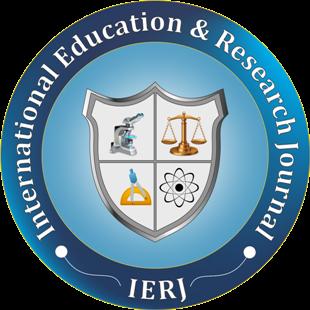PEDAGOGY IN DEVELOPING SUSTAINABLE COMPETENCIES OF ELEMENTARY SCHOOL STUDENTS
1 2Mrs.BidulataSahoo,Dr.SudarshanMishra
1ResearchScholar,DepartmentofEducation,RavenshawUniversity,Cuttack,India.

2Prof.&Head,DepartmentofEducation,RavenshawUniversity,Cuttack,India.
ABSTRACT
Today, the world is facing a variety of problems caused by human development activities such as climate change, biodiversity losses, resource depletion and the expansionofpoverty ESDcompriseslearningandeducationalactivitiesthataimtodevelopalternativevaluesandtransformativeactionsthatleadtoproblem-solving and to realize a sustainable society by taking the initiative to accept these problems of modern society as our own and tackling the problems in our immediate environment (think globally, act locally) in order to ensure that human beings are able to secure an abundant life for future generations. Education for sustainable development's primary concern is the improvement of the quality of life for people without damaging the environment. This can be possible if we reorient our educationsystemandmakefuturegenerationscapableenoughtofacechallengesoflifeandsaveenvironment.Thisarticledescribesthesustainablecompetenciesand developmentofthiscompetenciesamongelementarystudents,throughalearningpackagewhichcomprises,contentsrelatedtosustainabledevelopmentandESD pedagogy
KEYWORDS:Effectiveness,LearningPackage,Sustainablecompetencies,Elementarystudents.
BACKGROUNDOFTHESTUDY:
Education for sustainable development (ESD) is about shaping a better tomorrowforall-anditmuststarttoday ESDempowerslearnerstotakeinformeddecisionsandresponsibleactionsforenvironmentalintegrity,economicviabilityand a justified society, for present and future generations, while respecting cultural diversity Itisaboutlifelonglearning,andisanintegralpartofqualityeducation. ESDisholisticandtransformationaleducationwhichaddresseslearningcontent and outcomes, pedagogy and the learning environment. It achieves its purpose bytransformingsociety Italsorequiresparticipatoryteachingandlearningmethods that motivate and empower learners to change their behaviour and take actionforsustainabledevelopment.EducationforSustainableDevelopmentconsequentlypromotescompetencieslikecriticalthinking,imaginingfuturescenariosandmakingdecisionsinacollaborativeway
LITERATUREREVIEW:
Theinvestigatorconductedsomereviewsondifferentapproachesusedindifferenteducationalinstitutionsbyteachersfordifferentlevelchildrentodevelopcritical thinking and sustainability awareness and knowledge among them such as (Pellicer2007),(Atkinson2007),(Albashaireh2007),(Behera2007),(Binkley 2003), (James 2002), (Andrew 2007), (Dass & Deal 2007), (Santi et al. 2007), (MohdNor&Assanarkutty2007)andfoundedthatmostofthechildrenparticipatinginthestudyhavegainedadeeperknowledge,understandingandideaof sustainability issues environmental education and have been able to address thoseissuesinalocalcontext.Therewasdifferenceontheachievementofthestudent'spost-testinfavourofthosewhoweretaughtbythesystemicapproachprogram.
RATIONALEOFTHESTUDY:
We are responsible for environmental and ecological deterioration. But we shouldworkforapresentandfuturebuiltontheprinciplesofenvironmentaljustice,equityandhumandevelopment.Inthisregard,theroleofeducationiscriticalasitisthecornerstoneofamodernsociety Therefore,inviewofthecurrent environmentalcrisis,thecontentofeducationrequiresrestructuring.Thiswould mean that education systems across the world would be required not only to makeapersonemploymentworthy,itwouldhavetocapacitatepeoplewithvaluesthatwouldhelpthemunderstandtheirrelationshipwiththesocietyandenvironmentandempowerapersonleadalifeofcontentmentandsatisfaction.Inthis context,educationwillhavetogobeyondmeretransferofinformation.Sustainabledevelopmentisoneofthecentralchallengesfacingtheworldtoday Thus, ESDshouldnotbeseennarrowlyasanothersubjectorconcerntobeaddedonto theformaleducationsystemoraworkplacetrainingprogramme.Rather,ESDis ateachingandlearningprocessthroughwhichunderstandingofandorientation towardssustainabledevelopmentbecomesembeddedinthecoreeducationand learning processes to be found in societies everywhere. In this connection the researcherhasgothroughmorethan100researchpapersondifferentaspectsof sustainable development like education for sustainable development, environmental education, sustainable development goals, sustainable classroom, campus,integrationofsustainabilityconceptincurriculum,sustainabilityinhigher education etc. and found less no. of experimental studies in this area.As it is a very demanding concept to know, to understand, to implement, to integrate, to apply,todothenecessaryactionforbettermentoftheenvironmentandsociety,
theresearcherhastakenthisstudy
OperationalDefinition:
Ÿ Learningpackage:Inthisstudylearningpackagereferstoasetlessonplan preparedbytheresearcheronsomesustainableissueundertakenfromVIII classscienceandsocialsciencebook.ThelessonplanwasdevelopedbyfollowingtheESDpedagogypublishedoneducationforsustainabledevelopmentsourcebook(UNESCO2012).Theteachingtechniquessuchasclass discussion, issue analysis and storytelling question answer etc. were used duringteachinglearningprocess.
Ÿ SustainableDevelopment:Developmentthatmeetstheneedsofthepresentwithoutcompromisingtheabilityoffuturegenerationstomeettheirown needs.(Burdtlandcommission1987).
Ÿ
ElementarySchool:ThisreferstotheGovernmentschoolswhichprovide8 yearsofschoolingfromClassItoVIIIwithintheagegroupof6to14years.
Ÿ SustainableCompetencies:Competenciesrefertoconceptsandskillsthat enablestudentstounderstandandresolvecomplexsustainabilityproblems andtasks(Frisk&Larson,2011).Competencyreferstoanyaspectofacompetence, such as knowledge, skill, attitude, ability, or learning objective. Competency a combination of skills, underpinning knowledge and experience. Here in this study sustainable competency refers to the knowledge, understanding and skills of the students which enable them to know and understand the concept of sustainable development, and modify their attitudetowardsasustainablefuture.
OBJECTIVESOFTHESTUDY:
1. To evaluate the effectiveness of ESD Pedagogy in developing sustainable competenciesamongelementaryschoolstudents.
HYPOTHESIS:
H01: ThereisnosignificantdifferenceinsustainablecompetenciesbetweenelementaryschoolstudentstaughtthroughESDPackageandtraditionalmethodsof teaching.
METHODOLOGYOFTHESTUDY:
Thestudywasanexperimentaltypeofresearch,thesolepurposebeingtheexamination of the effectiveness of sustainable development learning package on developingsustainablecompetenciesandattitudetowardssustainabledevelopment of elementary students. In the intact situation the pre-assembled groups havebeenusedbytheresearcherforassigningexperimentalandcontrolgroups. HenceaQuasiexperimentaldesign(Pre-testpost-testcontrolgroupdesign)has beenfollowedinthestudy
Sampleandsamplingtechnique:
Forthepresentstudythepurposivesamplingmethodhadbeenusedforselecting sample.Oneschooli.e.BaliaNHS,Kendraparawaspurposivelyselectedforthe sake of convenience in conducting the experiment for the study Two sections (Section-A& B) of classVIII of Balia NHS was selected as control group and
experimentalgrouprespectively No.ofstudentsineachsectionwere35and35 respectively StudentsofclassVIIIstudyinginOdiamediumschoolfollowsthe courseprescribedbytheBSE,Odisha,werethesamplecomprisedofbothboys andgirls.
Toolsandtechniquesused:
In this study, a competency test had been developed (based on ten chapters related to sustainable development ideas from science and social science text books of classVIII of Odia medium school to determine their level of competency Itwasdevelopedbytheresearchertoassessthesustainablecompetencies attainedbythestudents.
Procedureofdatacollection:
Data were collected in three phases i.e. pre-experimental phase, experimental phase and post-experimental phase. Before starting the treatment, the decision about sample, items in competency test, development of learning package and schoolpermissionwasfinalized.Duringthetreatmentprocess,theexperimental groupwasexposedtotheESDPedagogyandcontrolgroupwasexposedtothe traditional approach. The researcher herself was the teacher to teach both the experimentalgroupandcontrolgroupinsampleschoolseparately Duringteachinginexperimentalandcontrolgroupclass,fifteenlessonsweredelivered.The control group followed traditional method of teaching in which lesson plans were based on objectivity principles of introduction, presentation and evaluation.Thetreatmentperiodofboththeexperimentalandcontrolgroupswasfour weeksfrombeginningofacademicsession.Attheendoftheexperiment,thesustainable competency test and attitude test was administered to both the experimentalandcontrolgroupinordertocomparetheirsustainablecompetencyand attitudetowardssustainabledevelopment.
Procedureofdataanalysis:
The present study was an experimental and developmental in nature. The data werecollectedthroughpre-testandpost-testonsustainablecompetenciesofstudents.Thedatawereanalysedquantitativelythroughapplicationofrequiredstatisticaltechniques,i.e.mean,standarddeviationandt-test.
RESULTS:
1. ImpactofESDPedagogyondevelopingsustainablecompetenciesofelementarystudents.
The effectiveness of ESD Pedagogy on developing sustainable competenciesofclassVIIIstudentswasstudiedthroughpre-testandpost-testcontrol groupdesignusingsustainablecompetencytest.Thistestwasdevelopedby theinvestigatorherselfwhichincludesknowledge,understandingbasedand attitudereflecteditems.
Table1:Pre-testmean,SDandt-valueofscoresinsustainable competenciesofboththegroups
Group N Mean SD df SED t-ratio p-value
ControlGroup 35 22.77 6.84 68 1.88 0.667 0.507 ExperimentalGroup 35 24.03 8.80
Table-1showsthet-value(0.667)ofpre-testscoreofcontrolandexperimental group in sustainable competency of students with df-68 is not significant as pvalueof0.507isgreaterthan0.05levelofsignificance.Itindicatesthatthereis nosignificantdifferenceinthepre-testscoreofexperimentalgroupandcontrol group on sustainable competency of students. Hence, pre-test score of control andexperimentalgroupstudentshaveexhibitedsimilarsustainablecompetency skills.
GraphicalrepresentationofdatawasalsoattemptedinFigure1todisplayvarianceindevelopmentofsustainablecompetenciesofboththegroupsbeforetreatment.
Inordertoconfirmtheinterventioneffecti.e.effectofESDPedagogyindeveloping sustainable competencies of elementary students, the post-test result of competencytestscoresforboththegroupswereexamined.Thepost-testmean, SDandt-valueofscoresinsustainablecompetenciesofboththegroupsaregiven inTable-2.
Table
2:Post-testmean,SDandt-valueofscoresinsustainable competenciesoftwogroups
Group N Mean SD df SED t-ratio p-value
ControlGroup 35 25.94 7.01 68 1.59 9.011 0.000 ExperimentalGroup 35 40.26 6.26
Table2showsthatt-valueof9.011withdf-68issignificantat0.01levelofsignificance. It indicates that the sustainable competency score of experimental group taught through ESD Pedagogy differed significantly from control group taughtthroughtraditionalmethodsofteaching.Fromtheabovetableitisfound thatthemeansustainablecompetencyscoreofexperimentalandcontrolgroup are25.94and40.26respectively So,thenullhypothesisearlierstated“Thereis no significant difference in sustainable competencies between elementary schoolstudentstaughtthroughESDPedagogyandtraditionalmethodsofteaching” is rejected.Therefore, it may be concluded that learning through the ESD Pedagogy has substantially improved the sustainable competencies among experimentalgroupascomparedtothecontrolgrouptaughtthroughtraditional method of teaching. The above result supports the earlier research findings of Bhagat&Oraon(2005),Dimitriou,(2007),Dash(2008),Ozturk(2012),Louw (2013), Alexandar & Poyyamoli (2014), Hidalgo & Fuentes (2013), Sims & Falkenberg(2013),Sharma(2016)andBorges(2019).
GraphicalrepresentationofdatawasalsoattemptedinFigure-2todisplayvarianceindevelopmentofsustainablecompetenciesofboththegroupsaftertreatment.
Fig:2:BarDiagramShowingpost-testmeanscoresofsustainable competenciesofcontrolgroupandexperimentalgroup.


FINDINGS:
Effect of ESD Pedagogy on developing Sustainable competencies: ESD pedagogyhassignificanteffectonstudent'ssustainablecompetenciesascomparedto thetraditionalmethodofteaching.Thesustainablecompetencyscoreofthesample students taught through ESD Pedagogy was found to be more than the studentstaughtthroughtraditionalmethodofteaching.
CONCLUSION:
Inordertoachievesustainabledevelopmentgoalandtomakesocietyandenvironment more sustainable, we should prepare our future generations efficient enough. This requires development of sustainable competencies among students.Developmentofsustainablecompetenciesamongelementarystudentsisa challenging task. In this study the developed learning package has a positive impact in developing sustainable competencies among elementary school students.
REFERENCES:
I. Kosaros, A (2007) The role of Sustainability in Environmental Education DebreceniEgyetem.
II. Jasper, J.C. (2008). Teaching for sustainable development: Teachers’ perception. Saskatoon, Saskatchewan Available at wwwcollectionscanada gc ca/obj/ / SSU/TC-SSU-02042009212522.pdf.
III. Mai,P.T (2007).InclusionofSustainableDevelopmentintoEducationatLundUniversity Awareness and willing to change. Lund, Sweden. Available at www lumes.lu.se/database/alumni/05.07/thesis/Phan_Truc%20Mai.pdf.
IV Mehta, P & Sharma, K. (2012). Innovative practices in education for sustainable development.PBRI,v.5(1).
V Pandya,H.etal.(2011).EducationforsustainabledevelopmentinIndia:Problems andprospects.IJSSE,v.1(3).
VI. Bangay,C.(2016).Protectingthefuture:Theroleofschooleducationinsustainable
development–anIndiancasestudyInternationalJournalofDevelopmentEducation andGlobalLearning8(1).Retrievedfromhttps://files.eric.ed.govon11/01/2019.
VII. Deopuria, R.P (1984).Acomparative study of teaching science through EnvironmentalandTraditionalapproachinschoolsofMadhyaPradesh.Ph.D.Edu.,Jabalpur University, Fourth survey of research in education (1983-1988),Vol I, M.B. Buch, NCERT,NewDelhi.
VIII. Rieckmann,M.(2018)Learningtotransformtheworld:KeycomponentsinEducation of Sustainable Development. Issues and trends in Education for Sustainable Development, UNESCO, available at https://unesdoc unesco org/ark:/48223/ pf0000261802
IX. www.education.ie/ESD
X. www.esdtoolkit.org
XI. www.unesco.org
XII. https://en.wikipedia.org/wiki/Sustainable_development
XIII. https://sustainabledevelopment.un.org/topics/sustainabledevelopmentgoals
